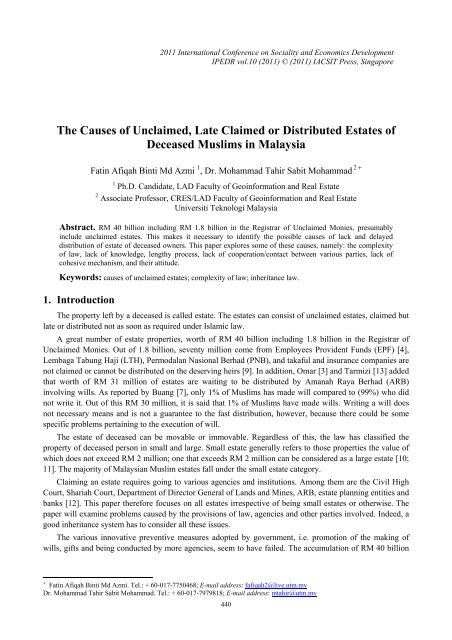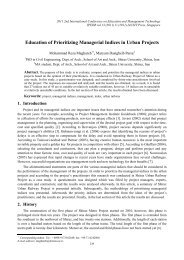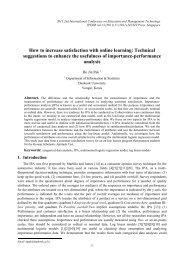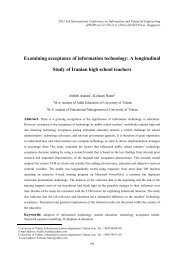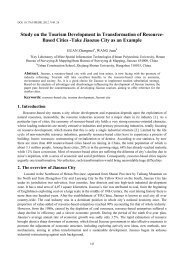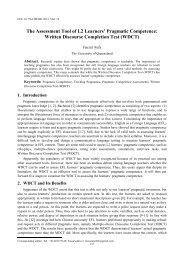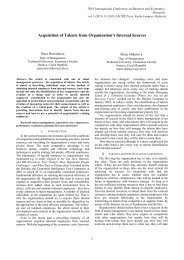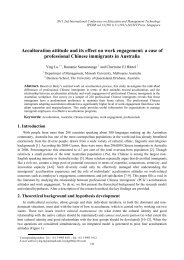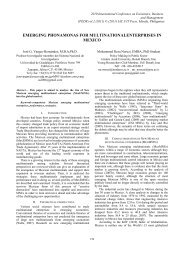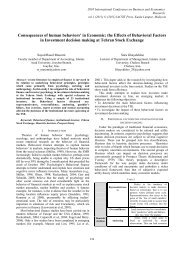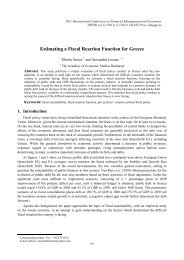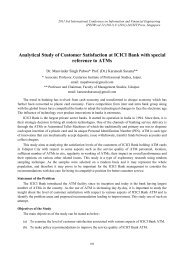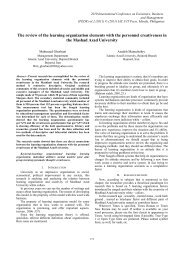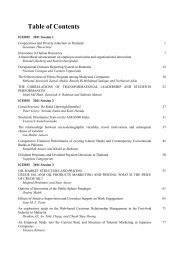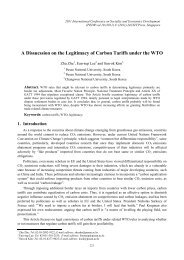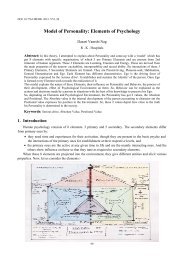The Causes of Unclaimed, Late Claimed or Distributed ... - ipedr
The Causes of Unclaimed, Late Claimed or Distributed ... - ipedr
The Causes of Unclaimed, Late Claimed or Distributed ... - ipedr
Create successful ePaper yourself
Turn your PDF publications into a flip-book with our unique Google optimized e-Paper software.
2011 International Conference on Sociality and Economics Development<br />
IPEDR vol.10 (2011) © (2011) IACSIT Press, Singap<strong>or</strong>e<br />
<strong>The</strong> <strong>Causes</strong> <strong>of</strong> <strong>Unclaimed</strong>, <strong>Late</strong> <strong>Claimed</strong> <strong>or</strong> <strong>Distributed</strong> Estates <strong>of</strong><br />
Deceased Muslims in Malaysia<br />
Fatin Afiqah Binti Md Azmi 1 , Dr. Mohammad Tahir Sabit Mohammad 2 +<br />
1 Ph.D. Candidate, LAD Faculty <strong>of</strong> Geoinf<strong>or</strong>mation and Real Estate<br />
2 Associate Pr<strong>of</strong>ess<strong>or</strong>, CRES/LAD Faculty <strong>of</strong> Geoinf<strong>or</strong>mation and Real Estate<br />
Universiti Teknologi Malaysia<br />
Abstract. RM 40 billion including RM 1.8 billion in the Registrar <strong>of</strong> <strong>Unclaimed</strong> Monies, presumably<br />
include unclaimed estates. This makes it necessary to identify the possible causes <strong>of</strong> lack and delayed<br />
distribution <strong>of</strong> estate <strong>of</strong> deceased owners. This paper expl<strong>or</strong>es some <strong>of</strong> these causes, namely: the complexity<br />
<strong>of</strong> law, lack <strong>of</strong> knowledge, lengthy process, lack <strong>of</strong> cooperation/contact between various parties, lack <strong>of</strong><br />
cohesive mechanism, and their attitude.<br />
Keyw<strong>or</strong>ds: causes <strong>of</strong> unclaimed estates; complexity <strong>of</strong> law; inheritance law.<br />
1. Introduction<br />
<strong>The</strong> property left by a deceased is called estate. <strong>The</strong> estates can consist <strong>of</strong> unclaimed estates, claimed but<br />
late <strong>or</strong> distributed not as soon as required under Islamic law.<br />
A great number <strong>of</strong> estate properties, w<strong>or</strong>th <strong>of</strong> RM 40 billion including 1.8 billion in the Registrar <strong>of</strong><br />
<strong>Unclaimed</strong> Monies. Out <strong>of</strong> 1.8 billion, seventy million come from Employees Provident Funds (EPF) [4],<br />
Lembaga Tabung Haji (LTH), Permodalan Nasional Berhad (PNB), and takaful and insurance companies are<br />
not claimed <strong>or</strong> cannot be distributed on the deserving heirs [9]. In addition, Omar [3] and Tarmizi [13] added<br />
that w<strong>or</strong>th <strong>of</strong> RM 31 million <strong>of</strong> estates are waiting to be distributed by Amanah Raya Berhad (ARB)<br />
involving wills. As rep<strong>or</strong>ted by Buang [7], only 1% <strong>of</strong> Muslims has made will compared to (99%) who did<br />
not write it. Out <strong>of</strong> this RM 30 million, it is said that 1% <strong>of</strong> Muslims have made wills. Writing a will does<br />
not necessary means and is not a guarantee to the fast distribution, however, because there could be some<br />
specific problems pertaining to the execution <strong>of</strong> will.<br />
<strong>The</strong> estate <strong>of</strong> deceased can be movable <strong>or</strong> immovable. Regardless <strong>of</strong> this, the law has classified the<br />
property <strong>of</strong> deceased person in small and large. Small estate generally refers to those properties the value <strong>of</strong><br />
which does not exceed RM 2 million; one that exceeds RM 2 million can be considered as a large estate [10;<br />
11]. <strong>The</strong> maj<strong>or</strong>ity <strong>of</strong> Malaysian Muslim estates fall under the small estate categ<strong>or</strong>y.<br />
Claiming an estate requires going to various agencies and institutions. Among them are the Civil High<br />
Court, Shariah Court, Department <strong>of</strong> Direct<strong>or</strong> General <strong>of</strong> Lands and Mines, ARB, estate planning entities and<br />
banks [12]. This paper theref<strong>or</strong>e focuses on all estates irrespective <strong>of</strong> being small estates <strong>or</strong> otherwise. <strong>The</strong><br />
paper will examine problems caused by the provisions <strong>of</strong> law, agencies and other parties involved. Indeed, a<br />
good inheritance system has to consider all these issues.<br />
<strong>The</strong> various innovative preventive measures adopted by government, i.e. promotion <strong>of</strong> the making <strong>of</strong><br />
wills, gifts and being conducted by m<strong>or</strong>e agencies, seem to have failed. <strong>The</strong> accumulation <strong>of</strong> RM 40 billion<br />
+ Fatin Afiqah Binti Md Azmi. Tel.: + 60-017-7750468; E-mail address: fafiqah2@live.utm.my<br />
Dr. Mohammad Tahir Sabit Mohammad. Tel.: + 60-017-7979818; E-mail address: mtahir@utm.my<br />
440
ep<strong>or</strong>ted by media is evidence, which suggests a need f<strong>or</strong> further review. This failure could be because not all<br />
<strong>or</strong> the right causes <strong>of</strong> such accumulation were identified.<br />
2. Problems <strong>of</strong> Muslim Estates<br />
This paper suggests that there are six main possible causes <strong>of</strong> unclaimed <strong>or</strong> delayed distribution <strong>of</strong><br />
estates. This needs to be tackled in <strong>or</strong>der to prevent further accumulation <strong>of</strong> unclaimed estates.<br />
<strong>The</strong> causes <strong>of</strong> unclaimed estate can be legal and administrative constraints. <strong>The</strong>y are: (1) the complexity<br />
<strong>of</strong> law; (2) the lack <strong>of</strong> knowledge; (3) lengthy process; (4) the lack <strong>of</strong> cooperation and/<strong>or</strong> contact between<br />
various parties; (5) the lack <strong>of</strong> a cohesive mechanism; and (6) attitude that needs to be discovered.<br />
2.1. Complexity <strong>of</strong> Law<br />
<strong>The</strong>re has been a number <strong>of</strong> cases <strong>of</strong> estates remaining unclaimed because <strong>of</strong> no application has been<br />
made by the heirs. This may be so f<strong>or</strong> several reasons caused by the law.<br />
As result <strong>of</strong> classification <strong>of</strong> estates into large and small, their distribution falls within jurisdiction <strong>of</strong> two<br />
courts and two administrative agencies. Acc<strong>or</strong>ding to Section 25 <strong>of</strong> the Civil Law Act 1956, the<br />
administration <strong>of</strong> Muslim’s estate shall be in acc<strong>or</strong>dance with the Islamic law. But Article 74 (1) <strong>of</strong><br />
Malaysian Federal Constitution read with Ninth Schedule Paragraph 4 (e) (i), provides that the Civil High<br />
Court has the jurisdiction over matters relating to succession, testate and intestate, probate and letters <strong>of</strong><br />
administration. Thus, in light <strong>of</strong> Article 121A Muslims have to go to Shariah and Civil Courts f<strong>or</strong> claiming<br />
the estate <strong>of</strong> a deceased person. At the same time, Section 17 (1) <strong>of</strong> Public Trust C<strong>or</strong>p<strong>or</strong>ation Act 1995 (Act<br />
532) gives the power to ARB to dispose movable properties whether testate <strong>or</strong> intestate which is less than<br />
RM 2 million, while the claimant can go to the Land Office f<strong>or</strong> immovable properties which is not exceeding<br />
RM 2 million. Besides, Section 8 (1) <strong>of</strong> Small Estates (Distribution) Act 1955 (Act 98) prescribes ARB has<br />
the jurisdiction in small estate distribution included movable and immovable properties even though in the<br />
absent <strong>of</strong> a will. This section states that estates <strong>of</strong> Muslims, movable <strong>or</strong> immovable, exceeding RM 2 million<br />
comes within the powers <strong>of</strong> High Court. Section 77 <strong>of</strong> Probate and Administration Act 1959 (Revised-1972)<br />
(Act 97) enjoins that an execut<strong>or</strong> has unlimited power to distribute estates <strong>of</strong> a deceased person but under<br />
this Act the execut<strong>or</strong> has to apply f<strong>or</strong> letter <strong>of</strong> execution from Civil High Court. <strong>The</strong> transmission process <strong>of</strong><br />
estate, which does not exceed RM 2 million, f<strong>or</strong> example in Land Office, can begin without lawyers going to<br />
Court. It may take five and a half months [10].<br />
<strong>The</strong> existence <strong>of</strong> various regulations and the involvement <strong>of</strong> several bodies in the distribution <strong>of</strong> the<br />
estates make the law and the process <strong>of</strong> claiming estates complex, which has led to overlapping powers and<br />
the responsibilities <strong>of</strong> these entities. An heir <strong>of</strong> the deceased may be puzzled by the complexity <strong>of</strong> law and<br />
procedures, which may affect his decision to claim the estate. Even if he makes a claim, the procedures <strong>of</strong><br />
claiming estates may probably be delayed. This may be true if he made his application bef<strong>or</strong>e a wrong<br />
agency. No matter where the application is made, beneficiaries need to produce the certificate <strong>of</strong> death by the<br />
Department <strong>of</strong> National Registration. Only a specific group <strong>of</strong> beneficiaries can apply f<strong>or</strong> such a certificate.<br />
In the absence <strong>of</strong> such a group <strong>of</strong> beneficiaries a lawyer needs to be appointed. Upon production <strong>of</strong><br />
certificate <strong>of</strong> death the beneficiaries then can claim the estate. <strong>The</strong>y are given three options to settle the estate<br />
distribution under Section 15 (1) <strong>of</strong> Small Estates (Distribution) Act 1955, that is: (i) distribution under<br />
farai’d system; (ii) distribution <strong>of</strong> estate by agreement <strong>of</strong> all beneficiaries without applying the farai’d<br />
system; and (iii) all beneficiaries agree to distribute the estates to the selected beneficiaries <strong>or</strong> some<br />
beneficiaries withdraw from receiving the estates. Where first option is taken, a certificate <strong>of</strong> farai’d from<br />
Shariah High Court need to be obtained. <strong>The</strong>re might be cases where the subject estate may not be<br />
distributed f<strong>or</strong> several generations. It may then take a month to clear the case, considering the complexity <strong>of</strong><br />
the case and lack <strong>of</strong> experts.<br />
All <strong>of</strong> the above makes it clear that certain beneficiaries may not claim estate <strong>of</strong> the deceased due to such<br />
complexity and reluctance to appoint a lawyer. Yet, if they do make claim, it may take them long time to do<br />
so, and once they apply the process may be lengthy f<strong>or</strong> the reasons stated above.<br />
A delayed distribution <strong>of</strong> estates could occur in term <strong>of</strong> execution <strong>of</strong> will. Will is used f<strong>or</strong> giving a<br />
p<strong>or</strong>tion <strong>of</strong> the estate to those who are not included in the list <strong>of</strong> heirs under farai’d system, either f<strong>or</strong><br />
441
individual such as adopted child, <strong>or</strong>phaned grandchild, foster parents, non-Muslim family member, etc. <strong>or</strong> f<strong>or</strong><br />
institutions including mosque, <strong>or</strong>phanage, charitable <strong>or</strong>ganization, hospital, and others. A fatwa dated 20 th <strong>of</strong><br />
September 1973 relating to the nominees in insurance policies, Tabung Haji and EPF savings [12], make<br />
these entities to be the execut<strong>or</strong>s <strong>of</strong> the will <strong>of</strong> the deceased distribute all the said properties on the deserving<br />
heirs under the farai’d system. Under this fatwa the nomination in the insurance policy does not amount to<br />
will and the nominated person can be considered as the execut<strong>or</strong> <strong>of</strong> the estate. Disputes over the estate may<br />
occur among the heirs if the nominee insists on being the beneficiary/legatee <strong>of</strong> the insurance policies,<br />
Tabung Haji and EPF savings [12]. Problem may also arise when there exists a joint account with the<br />
deceased. In the absence <strong>of</strong> will <strong>or</strong> surviv<strong>or</strong>ship clause written in the joint account agreement [8] the assets<br />
will be divided acc<strong>or</strong>ding to farai’d under the above fatwa.<br />
<strong>The</strong> distribution <strong>of</strong> estates could be delayed by enf<strong>or</strong>cing an implied <strong>or</strong> constructive will. An implied will<br />
refers to an ineffective and problematic declaration <strong>of</strong> gift (hibah), which results into will. In Re Ismail bin<br />
Rentah (1939) 230, the deceased owner had named his daughter as nominee f<strong>or</strong> shares and all benefits from<br />
his company after the deceased’s death. After he died, the Registrar made an <strong>or</strong>der to distribute all the<br />
properties <strong>of</strong> the deceased to the family heirs acc<strong>or</strong>ding to farai’d not a gift to her. <strong>The</strong> Court held that it<br />
cannot be considered as gift because no delivery <strong>of</strong> possession has been made from the don<strong>or</strong> to the donee at<br />
the time. It only can be called gift on deathbed, which can be treated as will under the law. In another case,<br />
Rosmawati binti Sharibun & Anothers (2002) 4 AMR 4913, the issue was whether <strong>or</strong> not the deceased and<br />
his third wife’s money which were in two joint accounts could be considered as gift. It was held that the joint<br />
account did not amount to gift because the third wife did not have exclusive control over the account as she<br />
has to obtain the signature <strong>of</strong> her husband during the lifetime <strong>of</strong> the husband. In this case, no exclusive<br />
ownership has been given because the qabd (taking possession) in gift is not being fulfilled, so it cannot be a<br />
valid gift but a will.<br />
<strong>The</strong> lack <strong>of</strong> claim may be due the family structure <strong>or</strong> the status <strong>of</strong> some members <strong>of</strong> the family. When<br />
only the adopted children survive the deceased they cannot claim the estate, unless there is a will made in<br />
their favour not exceeding 1/3 <strong>of</strong> the whole estate. Additionally, secret polygamy case can be another reason<br />
f<strong>or</strong> unclaimed estates. F<strong>or</strong> example, if there has been a double tragedy involving husband and first wife, and<br />
they have no children, but the husband leaves behind a secret <strong>or</strong> unregistered second wife. Unf<strong>or</strong>tunately, the<br />
second wife may not be able to claim the deceased’s estates if their marriage is not registered, and there<br />
exists no legal documents verifying the marriage. Where the dead husband leaves behind min<strong>or</strong> children,<br />
they will have rights to the estates <strong>of</strong> their father. Under law, a guardian should be appointed to administer<br />
the deceased’s estates f<strong>or</strong> their benefit since they are unable to claim due to their age. However, the claim<br />
may be delayed if the guardian did not claim f<strong>or</strong> them to obtain the estates in time.<br />
2.2. Lack <strong>of</strong> Knowledge<br />
Both substantive and procedural law is complex and difficult to be understood by layman. <strong>The</strong> lack <strong>of</strong><br />
knowledge <strong>of</strong> the deceased and the beneficiary <strong>of</strong> his estate might cause an estate unclaimed, lately claimed<br />
and delayed distribution. Many Muslims still do not make will and gift to distribute their property because<br />
they think the farai’d system is the only way whereby their properties could be transmitted to the heirs. This<br />
may result in delayed claims and distribution <strong>of</strong> the estate. <strong>The</strong> beneficiary <strong>of</strong> the estate, one related to the<br />
deceased by blood <strong>or</strong> cohabitation as well as the baitulmal, may not know the law, the property <strong>of</strong> the<br />
deceased [9], the making <strong>of</strong> will <strong>or</strong> hibah by the deceased, and whether <strong>or</strong> not he/she is entitled to the estate<br />
<strong>or</strong> a part there<strong>of</strong>. Similarly, the lack <strong>of</strong> knowledge and understanding <strong>of</strong> law, both Shariah and Civil, legal<br />
documents, and the involvement <strong>of</strong> varies agencies may lead to no claim, late claim <strong>or</strong> delayed distribution<br />
<strong>of</strong> estate. A beneficiary may be unwilling to initiate the process <strong>of</strong> distribution <strong>of</strong> the estate because he does<br />
not know whether <strong>or</strong> not the estate can be distributed under fara’id, will <strong>or</strong> trust. Beneficiaries, in some cases<br />
may discover new list <strong>of</strong> properties, in cash <strong>or</strong> otherwise, after the application has been made. This may<br />
contribute to late claims <strong>or</strong> delayed distribution <strong>of</strong> estates. In the case <strong>of</strong> intestate estate, the law prescribes<br />
its distribution among the heirs and baitulmal. <strong>The</strong> baitulmal may not know about the estate unless an<br />
application f<strong>or</strong> fara’id certificate is made <strong>or</strong> notified by an agency about the unclaimed estates. Where no<br />
442
such notification is given, and no legal heir survives the deceased, the estate can remain unclaimed<br />
considering the ambiguity in law and the lack <strong>of</strong> clear database.<br />
2.3. Lengthy Process<br />
<strong>The</strong> empowerment <strong>of</strong> two courts under substantive law and the procedures to be followed may be the<br />
reason f<strong>or</strong> unclaimed estates simply because the process is too lengthy and costly. <strong>The</strong> High Court has been<br />
empowered to grant a Probate in testate cases under Section 3 <strong>of</strong> Probate and Administration Act 1959, and<br />
Letter <strong>of</strong> Administration in intestate cases acc<strong>or</strong>ding to Section 18 <strong>of</strong> Probate and Administration Act 1959.<br />
<strong>The</strong> period <strong>of</strong> getting a Letter <strong>of</strong> Administration is longer than Probate f<strong>or</strong> testate estates. It may take up to<br />
four years to settle the case. Additionally, the Shariah Court has been vested with jurisdiction to ascertain the<br />
eligible heirs and their shares and to issue the certificate <strong>of</strong> farai’d to that effect [5]. Application to claim the<br />
estate involves costs; this may play significant role in making the beneficiaries <strong>of</strong> the estate not to claim it,<br />
especially when the value <strong>of</strong> the subject property after distribution is relatively small. In cases where an<br />
application is made by the beneficiaries, the time between application and final settlement <strong>of</strong> the case will be<br />
long and theref<strong>or</strong>e the distribution <strong>of</strong> the estate will also be long.<br />
2.4. Lack <strong>of</strong> Cooperation and/<strong>or</strong> Contact Between Various Parties<br />
Occasionally, the don<strong>or</strong> and trustee might not be in constant contact and theref<strong>or</strong>e the possibility <strong>of</strong><br />
claiming and distributing the estates will be remote. <strong>The</strong> trustee may come to know about the demise <strong>of</strong> the<br />
don<strong>or</strong> after a year <strong>or</strong> so, and thereafter he may initiate the process <strong>of</strong> claiming the estate f<strong>or</strong> the beneficiaries.<br />
In this case, the claim might be made late, which may also result in delayed distribution. Further, the<br />
distribution <strong>of</strong> estates could be delayed due to the lack <strong>of</strong> contact and cooperation between the beneficiaries.<br />
<strong>The</strong>y may not wish to attend the hearing <strong>or</strong> no decision could be made by the relevant agency because there<br />
is dispute between parties. <strong>The</strong>re might also be cases when a trustee does not discharge his responsibility and<br />
does not inf<strong>or</strong>m the beneficiaries about the estate <strong>or</strong> about the existence <strong>of</strong> declaration <strong>of</strong> will, gift <strong>or</strong> trust.<br />
Here, the estate may remain unclaimed.<br />
2.5. Lack <strong>of</strong> Cohesive Mechanism<br />
<strong>The</strong> lack <strong>of</strong> necessary database on the movable and immovable estates <strong>of</strong> the deceased owner may make<br />
the estates unclaimable. <strong>The</strong>re is no link between the Department <strong>of</strong> National Registration and other relevant<br />
agencies such as Land Office, Courts, Amanah Raya Berhad, banks and others in <strong>or</strong>der to access the required<br />
databases on dead persons, the identification cards and certificate <strong>of</strong> birth, certificate <strong>of</strong> marriage, grant <strong>of</strong><br />
land, current land taxation receipt and movable estates statements. Currently all inf<strong>or</strong>mation are obtained by<br />
individuals <strong>or</strong> lawyer through application. <strong>The</strong>re is no single body where all the above inf<strong>or</strong>mation can be<br />
accessed, claims can be speedily processed, <strong>or</strong> adjudicated. <strong>The</strong>ref<strong>or</strong>e, the distribution <strong>of</strong> an estate will be<br />
slow, expensive, discouraging and subject to a family tussle [9] based on farai’d, will, gift, and trust.<br />
2.6. Attitude<br />
Maj<strong>or</strong>ity <strong>of</strong> Malaysian Muslims are less sensitive to know their rights to inheritance [9], how and where<br />
to claim, as well as they might be less sensitive as to why they should apply. Indeed, the level <strong>of</strong><br />
consciousness about estate planning is still lower. Though, the imp<strong>or</strong>tance <strong>of</strong> having a will has been stressed<br />
upon, especially through banks, co-operatives and related bodies, educational and promotional programmers<br />
and also electronic media [4], it is presumed that such may not necessarily prevent the delayed in the<br />
distribution <strong>of</strong> estates.<br />
<strong>The</strong> distribution <strong>of</strong> estate may also be delayed by a claim made by non-Muslim relative <strong>of</strong> a deceased<br />
Muslim person. As the law is clear in Islam, and the convert knowingly excludes his non-Muslim family<br />
members there should remain no question about the rights <strong>of</strong> the non-Muslims to inherit from the said estate.<br />
Yet, claims are made by non-Muslims to the properties <strong>of</strong> their deceased kin. In the case <strong>of</strong> Federal Islamic<br />
Religious Council v Lim Ee Seng (2000), the High Court <strong>of</strong> Malaya held that a f<strong>or</strong>mer wife’s claim to her<br />
f<strong>or</strong>mer husband properties is dismissed because he had converted to Islam and she has no rights under<br />
Islamic inheritance law. In the above case, the dispute by the non-Muslim family member will cause further<br />
delay and the distribution can take place only after the court makes a decision about it.<br />
443
2.7. Conclusion<br />
Irrespective <strong>of</strong> whether <strong>or</strong> not a person passes away testate <strong>or</strong> intestate, due to the above six reasons, his<br />
estate is prone to being unclaimed, claimed but not sooner as should be, and distributed very late. In any<br />
event, it impedes the economics <strong>of</strong> individual, industry and government. <strong>The</strong> latest preventive measures<br />
introduced by government and undertaken by various bodies seem to be not as effective as one could wish.<br />
<strong>The</strong> accumulation <strong>of</strong> unclaimed RM 40 billion and so, as publicised by media, strongly suggest the above<br />
conclusion. <strong>The</strong>ref<strong>or</strong>e, the ref<strong>or</strong>m <strong>of</strong> the law and procedure is needed. F<strong>or</strong> this, a study is needed in <strong>or</strong>der to<br />
overcome the problems <strong>of</strong> complexity <strong>of</strong> law, lengthy and costly process, and non-cohesive mechanism, lack<br />
<strong>of</strong> knowledge and cooperation, and attitude <strong>of</strong> various parties.<br />
3. Acknowledgements<br />
<strong>The</strong> auth<strong>or</strong> would like to thank the anonymous reviewers f<strong>or</strong> useful comments. Zamalah/Institutional<br />
Scholarship provided by Universiti Teknologi Malaysia and the Ministry <strong>of</strong> Higher Education <strong>of</strong> Malaysia<br />
finances the w<strong>or</strong>k.<br />
4. References<br />
[1] Civil Law Act, 1956 (Act 67), 2006. <strong>The</strong> Commissioner <strong>of</strong> Law Revision Malaysia in Collab<strong>or</strong>ation with Malayan<br />
Law Journal Sdn Bhd and Percetakan Nasional Malaysia Berhad. www.lawnet.com.my<br />
[2] Federal Constitution, 2006. <strong>The</strong> Commissioner <strong>of</strong> Law Revision Malaysia in Collab<strong>or</strong>ation with Percetakan<br />
Nasional Malaysia Bhd. www.lawnet.com.my<br />
[3] Omar, R. (2009). Wasiat: Tool f<strong>or</strong> Islamic Estate Planning as Practiced at Amanah Raya Berhad. IFWMI<br />
Intellectual Discussion on Islamic Finance and Wealth Management. Presented Paper. Islamic Finance and<br />
Wealth Management Institute (IFWMI). Universiti Sains Islam Malaysia.<br />
[4] Patrick Sennyah (2007). RM 40b Waiting To Be Given To Heirs. New Sunday Times, pp: 3.<br />
[5] Probate and Administration Act 1959 (Revised-1972) (Act 97), 2006. <strong>The</strong> Commissioner <strong>of</strong> Law Revision<br />
Malaysia In Collab<strong>or</strong>ation With Percetakan Nasional Malaysia Bhd www.lawnet.com.my<br />
[6] Public Trust C<strong>or</strong>p<strong>or</strong>ation Act 1995 (Act 532), 2006. <strong>The</strong> Commissioner <strong>of</strong> Law Revision Malaysia In<br />
Collab<strong>or</strong>ation With Percetakan Nasional Malaysia Bhd. www.lawnet.com.my<br />
[7] Salleh Buang (2010). Instrumen Perancangan Harta Pusaka Islam: Amanah dan Hibah. Convention <strong>of</strong> Islamic<br />
Small Estate Planning System 2010. Institut Kefahaman Islam Malaysia (IKIM).<br />
[8] Shahanaaz Habib (2010). When <strong>The</strong> Money Is Tied Down. www.wasiat4u.com<br />
[9] Siti Mashitoh binti Mahamood (2008). Isu-isu Berbangkit Dalam Pengurusan Baitulmal Di Malaysia: Pemakaian<br />
Akta Wang Tak Dituntut 1965. Jurnal Pengurusan JAWHAR. Vol. 2, No. 1, 2008, pp: 99-113.<br />
[10] Sittamparam, R. (2009). RM 2m Limit to Small Estates from Sept 1. New Sunday Times, (August 16).<br />
[11] Small Estates (Distribution) Act 1955 (Act 98), 2006. <strong>The</strong> Commissioner <strong>of</strong> Law Revision Malaysia In<br />
Collab<strong>or</strong>ation With Percetakan Nasional Malaysia Bhd. www.lawnet.com.my<br />
[12] Suhaili Al-Ma’amun (2010). Islamic Estate Planning: Malaysian Experience. Kyoto Bulletin <strong>of</strong> Islamic Area<br />
Studies (March 2010), pp: 165-185.<br />
[13] Tarmizi Abdul Rahim (2009). RM 31j Harta Pusaka Masih Tidak Dituntut. Utusan Malaysia, (May 2009), pp: 23.<br />
444


